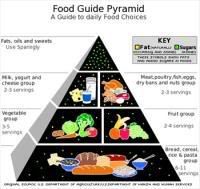
There are a number of things Boomers can do to keep their bodies healthy, from eating the right foods to taking vitamin and minerals, as well as exercising regularly.
One of the most important things you can do to remain healthy is to eat foods that nourish your body rather than just fill you up or satisfy an emotional problem. The Canadian Heart and Stroke Foundation has approved the new Canada Food Guide, which assures that you get your daily requirements of vitamins, minerals and other nutrients. By following the guidelines, you will be healthier, have more vitality and reduce your risk of chronic disease.
First of all, make sure you eat fruits and vegetables every day. Be creative! Choose colors, such as green broccoli, asparagus and lettuce, and orange carrots and sweet potatoes. Eating bread can add extra weight, unless you opt for 100 percent whole wheat or grain that contains fiber, minerals and vitamins. Choose brown and wild rice over white and add some oatmeal to your meal planning as well. The guide recommends eating fish twice a week but watch out for those high in mercury. And if you like it, add soy products to replace some meat. Otherwise, stick to shellfish, poultry and lean cuts of beef.
Instead of homogenized milk, opt for low fat and/or soy beverages. Also when purchasing drinks choose 100 percent fruit and/or vegetable juice. Use unsaturated oil, such as canola, soybean and olive. Consume no more than 2-3 tbsp. (30-45 ml) of unsaturated fat a day. Saturated fats raise the bad LDL cholesterol and lower the good HDL, which can lead to high blood pressure, narrowing of the arteries (atherosclerosis), heart attack and stroke.
One of the most important things you can do to remain healthy is to eat foods that nourish your body rather than just fill you up or satisfy an emotional problem. The Canadian Heart and Stroke Foundation has approved the new Canada Food Guide, which assures that you get your daily requirements of vitamins, minerals and other nutrients. By following the guidelines, you will be healthier, have more vitality and reduce your risk of chronic disease.
First of all, make sure you eat fruits and vegetables every day. Be creative! Choose colors, such as green broccoli, asparagus and lettuce, and orange carrots and sweet potatoes. Eating bread can add extra weight, unless you opt for 100 percent whole wheat or grain that contains fiber, minerals and vitamins. Choose brown and wild rice over white and add some oatmeal to your meal planning as well. The guide recommends eating fish twice a week but watch out for those high in mercury. And if you like it, add soy products to replace some meat. Otherwise, stick to shellfish, poultry and lean cuts of beef.
Instead of homogenized milk, opt for low fat and/or soy beverages. Also when purchasing drinks choose 100 percent fruit and/or vegetable juice. Use unsaturated oil, such as canola, soybean and olive. Consume no more than 2-3 tbsp. (30-45 ml) of unsaturated fat a day. Saturated fats raise the bad LDL cholesterol and lower the good HDL, which can lead to high blood pressure, narrowing of the arteries (atherosclerosis), heart attack and stroke.
Body Mass Index or BMI for adults is a tool that indicates your weight status measuring weight with height. Check it out Here!
Watch the amount of salt you use in cooking, baking and at the table. Try replacing the salt with herbs, garlic or lemon juice whenever possible. Too much salt raises your blood pressure so make sure you consume no more than 1 tsp. (5 ml) per day. Be aware that fast foods, processed meats, canned soup, bottled dressings, ketchup and pickles may also be high in salt and avoid salty snacks like chips and peanuts. Choose such snacks as unsalted nuts, dried fruit, trail mix, fruit or vegetable slices, raisins or plain popcorn. For a brochure on healthy snacks go Here.

Watch the amount of salt you use in cooking, baking and at the table. Try replacing the salt with herbs, garlic or lemon juice whenever possible. Too much salt raises your blood pressure so make sure you consume no more than 1 tsp. (5 ml) per day. Be aware that fast foods, processed meats, canned soup, bottled dressings, ketchup and pickles may also be high in salt and avoid salty snacks like chips and peanuts. Choose such snacks as unsalted nuts, dried fruit, trail mix, fruit or vegetable slices, raisins or plain popcorn. For a brochure on healthy snacks go Here.

Currently, there is a crisis in North America when it comes to weight, with far too many children and adults that are obese. Those who are overweight generally have higher levels of interleukin-6, C-reactive protein and fibrinogen — proteins that can cause inflammation in the heart and congestive heart failure. The obese may also have metabolic syndrome, such as high blood pressure, blood sugar and cholesterol levels, all of which can lead to chronic illness. If you are obese, it is more important than ever to follow the healthy eating guidelines. You also need to watch your calorie intake and you can get help with that Here.
Take the Calorie Quiz
Vitamins and minerals are nutrients your body needs to remain healthy and stave of disease. For instance, people with too little Vitamin D can get rickets and a lack of calcium can lead to brittle bones and osteoporosis. Knowing what vitamins and minerals are best for your body can make all the difference but it can be confusing because there are so many of them. Fortunately, the National Institute of Health has come up with a fact sheet, which you can access Here.
Once the inside of your body is being well cared for, make sure you protect the outside too. In the United States, skin cancer is diagnosed a million times each year and that statistic is pretty frightening. Most common are basel cell, squamous cell and melanoma cancers, with the latter being the deadliest. Fortunately, that one only makes up 4 percent, but over 75 percent of skin cancers can lead to death. Make sure you use a sunscreen of SPF of 15 or higher as often as possible. Dr. Elizabeth Hale, assistant professor of dermatology at New York University’s School of Medicine says the UV rays of the sun can also cause burns, rashes and even wrinkles, so you should consider wearing clothing that covers your skin and/or a hat as well. And don’t be fooled by the different grades such as SPF 15 and 30. According to The Skin Cancer Foundation, the latter does not give you double the protection. SPF 15 filters 93 percent and SPF 30 blocks 97 percent of the sun's UV rays. The trick to better protection is to apply the sunscreen every two hours. Finally, it is important to exercise and/or stretch your body regularly to boost your metabolism and stay limber. This subject will be covered in detail in an upcoming article.
Once the inside of your body is being well cared for, make sure you protect the outside too. In the United States, skin cancer is diagnosed a million times each year and that statistic is pretty frightening. Most common are basel cell, squamous cell and melanoma cancers, with the latter being the deadliest. Fortunately, that one only makes up 4 percent, but over 75 percent of skin cancers can lead to death. Make sure you use a sunscreen of SPF of 15 or higher as often as possible. Dr. Elizabeth Hale, assistant professor of dermatology at New York University’s School of Medicine says the UV rays of the sun can also cause burns, rashes and even wrinkles, so you should consider wearing clothing that covers your skin and/or a hat as well. And don’t be fooled by the different grades such as SPF 15 and 30. According to The Skin Cancer Foundation, the latter does not give you double the protection. SPF 15 filters 93 percent and SPF 30 blocks 97 percent of the sun's UV rays. The trick to better protection is to apply the sunscreen every two hours. Finally, it is important to exercise and/or stretch your body regularly to boost your metabolism and stay limber. This subject will be covered in detail in an upcoming article.


No comments:
Post a Comment